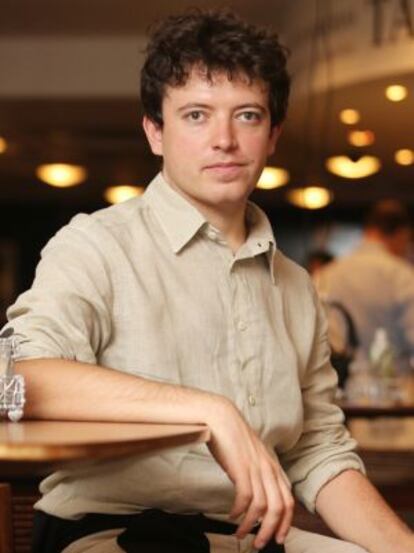Franco’s choirboys
The makers of a new documentary examine a boarding school inside the ex-dictator’s mausoleum


Franco left it all very well organized. Every day a group of "well-trained" children would sing in the basilica of the Valley of the Fallen to give greater solemnity to the Masses held there for the Civil War dead — the victims "of the glorious crusade." That is how the former dictator wanted it, and that is how it has remained to this day.
A chilling new documentary, A la sombra de la cruz (or, In the shadow of the cross), is offering a peek inside the boarding school for choirboys that has existed inside the great monument, located in the Guadarrama mountains outside Madrid, since 1958. Italian director Alessandro Pugno and Spanish producer Antonio Saura Medrano managed to get unprecedented access to the Valley of the Fallen, which is where the remains of Francisco Franco, Spanish Falange founder José Antonio Primo de Rivera and 33,847 victims of the Civil War from both sides rest.
"It's a jewel of a documentary," says Saura, "which shows us the reality without taking an extreme position, so that everyone can draw their own conclusions. What might seem normal for a believer could seem terrifying for those who see this like something from medieval times."
The film left viewers speechless at its Spanish premiere at Pamplona's Punto de Vista Festival, where it was seen as a sinister tale.
What might seem normal for a believer could seem terrifying for others"
Surrounded by the steep landscape of the Cuelgamuros Valley, the school for choirboys aged from eight to 14 is run by Benedictine monks who inculcate a message of resistance against what they consider their biggest threat: the secularization of society. Impervious to the passage of time, the claustrophobic rooms of the boarding school safeguard "the last crusade against secularism." "We are shocked by the madrasas in Afghanistan but not by something that is 50 kilometers from Madrid," Saura says.
Pugno remembers the first time he discovered the school. "I was living in Madrid and one day, heading up to El Escorial with my Spanish ex-girlfriend, we passed by the Valley of the Fallen.

"For me it was just a monument and the center of a heated debate about historical memory. When we got there, my girlfriend didn't want to go inside the church so I went in alone. I remember seeing that enormous space, without any light, and one of the monks. I found it all very cinematic."
When Pugno came up with the idea for the project, the monks offered no objection and he spent four years visiting and filming the choirboys. He thinks that two factors were fundamental in his gaining access to the school: "I am Italian and at the time I was only 26 years old. The only condition they imposed was that I respect the privacy of the boys."
As such, when the students are on screen, they are silent before the camera, their expressive faces all the more telling as a result. These scenes were the most shocking for the monks, who requested they be removed when they saw them in the film.
In one scene, in which a former pupil returns to take his vows as a monk, the silent boys sketch their imagined futures: one draws a rapper, another an archeologist and a third a novelist. "They are striking because they have a special innocence. They are not allowed to have any kind of electronic toys, nor can they access the internet, and they hardly watch TV. They entertain themselves with marbles or a ball and they show a great deal of respect for one another."
The boys aren't allowed any electronic toys, and hardly watch TV"
The boys at the Valley of the Fallen are recruited from schools across almost the whole of Spain, though they are mainly from Castilla-La Mancha and Castilla y León. Musician Víctor Herrero, a member of US folk singer Josephine Foster's band, attended the school, and does not have any dramatic memories of his time there. "My parents weren't even believers," he says via telephone. "They recruited me at the beginning of the 1990s in my school in Torrijos [Toledo province] via a simple test that Father Valentino had perfected: to sing [Christmas carol] Campana sobre campana. I went because I wanted to and though I now understand all the prohibitions at the place, I had a different experience. I liked being there — at that age you don't have a historical or religious conscience. It was only later that I understood where I had been sent. The truth is, and despite the obtrusive nature of the monument, it was more stimulating than Torrijas. They battered you with religious doctrine day and night but the musical education was very rich. A 11am we all went to sing a different Gregorian chant from the repertoire. It was very boring because of the discipline, but if I am a musician today, it is thanks to them."
The historian Ricard Vinyes was one of the members of the committee of experts that in 2011 studied the future of the site, which is in a state of progressive deterioration because of leaks, damp and "thermal stress." The fate of the monks there was one of the main obstacles they faced. "The committee always thought the Benedictines and the choir had to leave, but by law, the monks have power over the basilica, where Franco's tomb is," Vinyes explains. "It was all very complicated. The previous father refused to see us; for them we were the devil."
The filming of A la sombra de la cruz coincided with the protests over the closure of the basilica for restoration work. Organized by the school board, Masses began to be held on the esplanade in front of the basilica to demonstrate against the sealing off of parts of the site, and during one homily the secular offensive of former Socialist Prime Minister José Luis Rodríguez Zapatero's Spain was compared with that of the Civil War years. "Thousands of people arrived in buses," Pugno remembers. "It was then I saw the claustrophobic reality of the place, confined in a sacred mountain doomed to that last crusade. I felt a chill."
Tu suscripción se está usando en otro dispositivo
¿Quieres añadir otro usuario a tu suscripción?
Si continúas leyendo en este dispositivo, no se podrá leer en el otro.
FlechaTu suscripción se está usando en otro dispositivo y solo puedes acceder a EL PAÍS desde un dispositivo a la vez.
Si quieres compartir tu cuenta, cambia tu suscripción a la modalidad Premium, así podrás añadir otro usuario. Cada uno accederá con su propia cuenta de email, lo que os permitirá personalizar vuestra experiencia en EL PAÍS.
¿Tienes una suscripción de empresa? Accede aquí para contratar más cuentas.
En el caso de no saber quién está usando tu cuenta, te recomendamos cambiar tu contraseña aquí.
Si decides continuar compartiendo tu cuenta, este mensaje se mostrará en tu dispositivo y en el de la otra persona que está usando tu cuenta de forma indefinida, afectando a tu experiencia de lectura. Puedes consultar aquí los términos y condiciones de la suscripción digital.








































